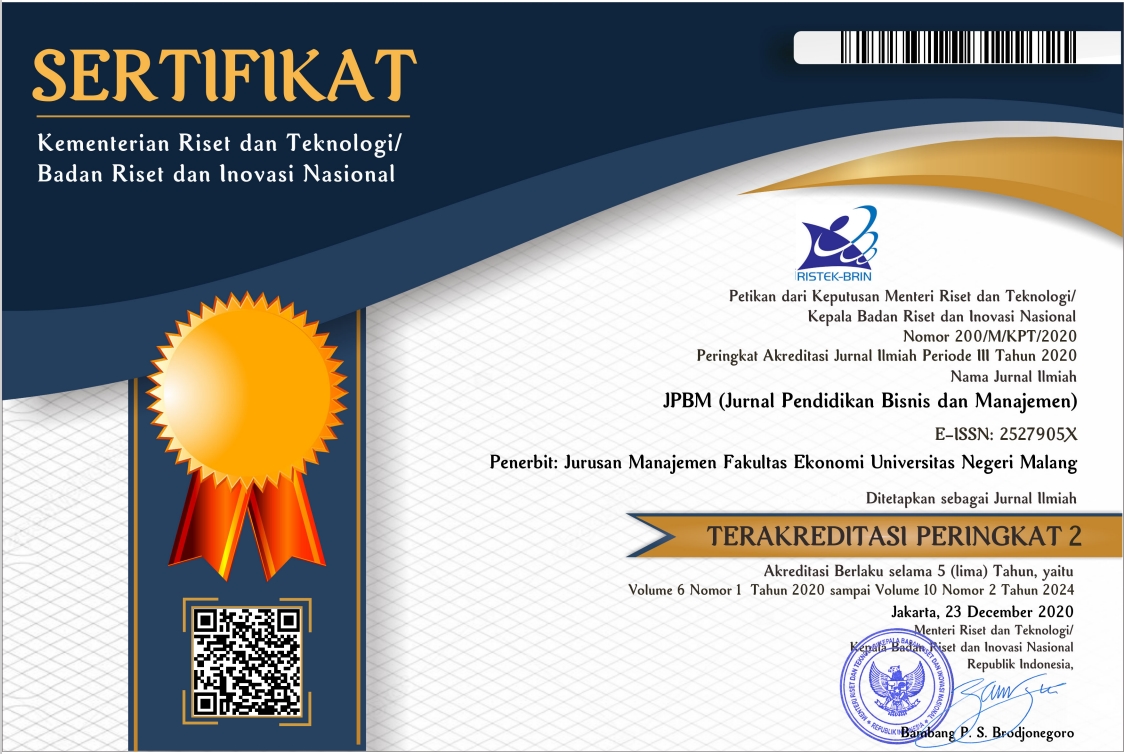Entrepreneurship Education and Students Entrepreneurial Intention: Does Teacher Creativity Really Matter?
Abstract
Escalating entrepreneurs is expected to provide more job opportunities that contributes in diminishing social and economic issues. This study aims to analyze the interconnectedness between teacher creativity and entrepreneurial intention as well as investigate the role of entrepreneurship education. This research adopted a descriptive correlational study that aims to analyze the nexus between variables using a quantitative approach study. This current study engaged primary data from an online questionnaire that was performed online to vocational students with five Likert scale choices. Furthermore, the statistical analysis was conducted using partial least squares-structural equation modeling (PLS-SEM) with the use of SmartPLS 3.0 software. The outcomes of this study indicate that teacher creativity takes a crucial role in determining students’ intention of being entrepreneurs. These results imply that teachers’ creativity in classroom learning to inspire, motivate, and encourage students can support entrepreneurship education as well as students’ entrepreneurial intention. The basic rationale is that entrepreneurship education is subjected to several aspects including cognitive, affective and psychomotor.
Keywords: Entrepreneurship education, Entrepreneurial intention, Students’ intention, Teacher’s creativity
Full Text:
PDFReferences
Ajzen, I. (1991). The theory of planned behaviour. Organizational Behaviour and Human Decision Processes, 50, 179–211. https://doi.org/10.1016/0749-5978(91)90020-T
Alshebami, A., Al-Jubari, I., Alyoussef, I., & Raza, M. (2020). Entrepreneurial education as a predicator of community college of Abqaiq students’ entrepreneurial intention. Management Science Letters, 10(15), 3605–3612. https://doi.org/10.5267/j.msl.2020.6.033
Aprilianty, E. (2013). The influence of entrepreneurial personality, entrepreneurial knowledge, and the environment on the interest in entrepreneurship in vocational students. Jurnal Pendidikan Vokasi. https://doi.org/10.21831/jpv.v2i3.1039.
Ayob, A., & Hussain, A. A. R. (2013). A review of research on creative teachers in higher education. International Education Studies, 6(6), 61–65. https://doi.org/10.5539/ies.v6n6p8
Bae, T. J., Qian, S., Miao, C., & Fiet, J. O. (2014). The relationship between entrepreneurship education and entrepreneurial intentions: A meta-analytic review. Entrepreneurship: Theory and Practice, 38(2), 1–18. https://doi.org/10.1111/etap.12095.
Chin, W., & Marcoulides, G. (1998). The partial least squares approach to structural equation modeling. Modern Methods for Business Research (pp.295-236). London: Lawrence Erlbaum Associates.
Denanyoh, R., Adjei, K., & Nyemekye, G. E. (2015). Factors that impact on entrepreneurial intention of tertiary students in Ghana. International Journal of Business and Social Research, 5(3), 19–29. https://doi.org/10.18533/ijbsr.v5i3.693
Dobbins, K. (2009). Teacher creativity within the current education system: a case study of the perceptions of primary teachers. Education, 37(2), 95–104. https://doi.org/10.1080/03004270802012632
Firmansyah, A. H., Djatmika, E. T., & Hermawan, A. (2016). The effect of adversity quotient and entrepreneurial self- efficacy on entrepreneurial intention through entrepreneurial attitude. Journal of Business and Management, 18(5), 2319–7668. https://doi.org/10.9790/487X-1805014555.
Fritsch, M., & Wyrwich, M. (2017). The effect of entrepreneurship on economic development—An empirical analysis using regional entrepreneurship culture. Journal of Economic Geography, 17(1), 157–189. https://doi.org/10.1093/jeg/lbv049
Hair, J. F., Ringle, C. M., & Sarstedt, M. (2013). Partial least squares structural equation modeling: Rigorous applications, better results and higher acceptance. Long Range Planning, 46(1-2), 1-12.
Hamidi, D.Y., Wennberg, K. & Berglund, H. (2008). Creativity in entrepreneurship education. Journal of Small Business and Enterprise Development, 15(2), 304–320. https://doi.org/10.1108/14626000810871691
Henry, C., & Lewis, K. (2018). A review of entrepreneurship education research: Exploring the contribution of the Education+Training special issues. Education+Training, 60(3), 263–286. https://doi.org/10.1108/ET-12-2017-0189
Kautonen, T., Van Gelderen, M., & Fink, M. (2015). Robustness of the theory of planned behavior in predicting entrepreneurial intentions and actions. Entrepreneurship Theory and Practice, 39(3), 655–674. https://doi.org/10.1111/etap.12056
Khuong, M. N., & An, N. H. (2016). The factors affecting entrepreneurial intention of the students of Vietnam national university—a mediation analysis of perception toward entrepreneurship. Journal of Economics, Business and Management, 4(2), 104-111. Retrieved from http://www.joebm.com/vol4/375-ET00036.pdf
Kibler, E., Kautonen, T., & Fink, M. (2014). Regional social legitimacy of entrepreneurship: Implications for entrepreneurial intention and start-up behaviour. Regional Studies, 48(6), 995–1015. https://doi.org/10.1080/00343404.2013.851373
Kim, M., & Park, M. J. (2019). Entrepreneurial education program motivations in shaping engineering students’ entrepreneurial intention. Journal of Entrepreneurship in Emerging Economies, 11(3), 328–350. https://doi.org/10.1108/JEEE-08-2018-0082
Kirkwood, J. (2009). Motivational factors in a push‐pull theory of entrepreneurship. Gender in Management, 24(5), 346–364. https://doi.org/10.1108/17542410910968805
Linan, F., & Chen, Y. (2009). Development and cross-cultural application of a specific instrument to measure entrepreneurial intentions. Entrepreneurship Theory and Practice, 593–617. https://doi.org/10.1111/j.1540-6520.2009.00318.x
Marini, C. K., & Hamidah, S. (2014). The effects of self-efficacy, family environment, and school environment on the entrepreneurial interest of the culinary service department. Jurnal Pendidikan Vokasi, 4(2), 1–14. https://doi.org/10.21831/jpv.v4i2.2545.
Murugesan, R., & Jayavelu, R. (2017). The influence of big five personality traits and self-efficacy on entrepreneurial intention: The role of gender. Journal of Entrepreneurship and Innovation in Emerging Economies, 3(1), 41–61. https://doi.org/10.1177/2393957516684569
Opoku-Antwi, G.L., Amofah, K., Nyamaah-Koffuor, K. & Yakubu, A. (2012). Entrepreneurial intention among senior high school students in the Sunyani Municipality. International Review of Management and Marketing, 2(4), 210-219. Retrieved from https://www.econjournals.com/index.php/irmm/article/view/250
Patriotta, G., & Siegel, D. (2019). The context of entrepreneurship. Journal of Management Studies, 56(6), 1194–1196. https://doi.org/10.1111/joms.12440
Pishghadam, R., Nejad, T.G. & Shayesteh, S. (2012). Creativity and its relationship with teacher success criatividade. Brazilian English Language Teaching Journal, 3(2), 204-216.
Rossmann, C. (2011). Theory of reasoned action - Theory of planned behavior. Nomos Verlagsgesellschaft mbH & Co. KG. https://doi.org/10.5771/9783845260341
Statistics Indonesia. (2020). Keadaan Ketenagakerjaan Indonesia Februari 2020. Jakarta: Badan Pusat Statistik.
Sutton, S. (2014). Theory of planned behaviour. In Cambridge Handbook of Psychology, Health and Medicine, Second Edition. https://doi.org/10.1017/CBO9780511543579.049
Urbano, D., Aparicio, S., & Audretsch, D. (2019). Twenty-five years of research on institutions, entrepreneurship, and economic growth: What has been learned? Small Business Economics, 53(1), 21–49. https://doi.org/10.1007/s11187-018-0038-0
Wallace, D. S., Paulson, R. M., Lord, C. G., & Bond Jr, C. F. (2005). Which behaviors do attitudes predict? Meta-analyzing the effects of social pressure and perceived difficulty. Review of general psychology, 9(3), 214–227. https://psycnet.apa.org/doi/10.1037/1089-2680.9.3.214
Wibowo, A, Saptono, A & Suparno. (2018). Does Teachers’creativity Impact on Vocational Students’entrepreneurial Intention? Journal of Entrepreneurship Education 21 (3), 1-12.
Wu, S., & Wu, L. (2008). The impact of higher education on entrepreneurial intentions of university students in China. Journal of Small Business and Enterprise Development, 15(4), 752–774. https://doi.org/10.1108/14626000810917843
Zampetakis, L. A. (2008). The role of creativity and proactivity on perceived entrepreneurial desirability. Thinking Skills and Creativity, 3(2), 154–162. https://doi.org/10.1016/j.tsc.2008.07.002
Zampetakis, L., Gotsi, M., Andriopoulos, C., & Moustakis, V. (2011). Creativity and entrepreneurial intention in young people: Empirical insights from business school students. The International Journal of Entrepreneurship and Innovation, 12(3), 1-20. https://doi.org/10.5367/ijei.2011.0037
DOI: http://dx.doi.org/10.17977/um003v9i12023p061
Refbacks
- There are currently no refbacks.
JPBM (Jurnal Pendidikan dan Bisnis Manajemen) is licensed under a Creative Commons Attribution-NonCommercial-ShareAlike 4.0 International License.
JPBM (Jurnal Pendidikan dan Bisnis Manajemen) is abstracted and indexed in :
















